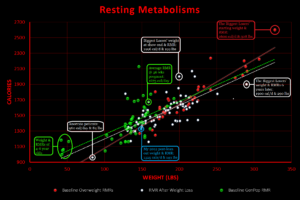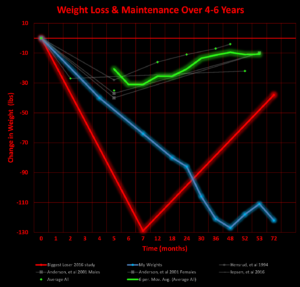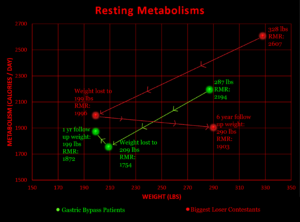We continue our discussion of the latest “Biggest Loser” study with a focus on the metabolism.
In the last couple of weeks, we’ve journal clubbed the latest “Biggest Loser” study and we’ve had a discussion section about a couple of different aspects of the study, including the weight results. To recap, the weight that the contestants lost and regained over 6 years is large in magnitude but not unusual in pattern/occurrence.
No one should take that to mean doom ‘n gloom, however. The contestants may have gained some weight, but most did not gain all of it back, they did not become diabetic with the regained weight (listen to Dr. Hall on NPR’s On Point podcast), and they had a stretch of much better health and prosperity than what they had before the show. Even more, there are plenty of examples of people who have lost a lot of weight and kept it off for a long time (NWCR, Look AHEAD, or this study).
No one should take the results of the Biggest Loser study to mean that all is lost.
Let’s continue with the next discussion section. This week we’re focusing in on the metabolism results. Like last time, I’ll list a comment or question pulled from around the web and then we’ll discuss it.
“Previous studies of metabolic adaptation have found no where near as much an adaptation as this study.”
The average RMRs of the contestants started at 2607 calories/day. They weighed an average 328 lbs then. At the end of the show, they had lost an average of 129 lbs and their RMRs lowered to an average 1996 calories/day. Given their initial body compositions and how they changed, the researchers expected the post-weight loss RMRs of the contestants to be an average 276 calories higher than they were. That less than expected RMR is known as “metabolic adaptation”. When Hall & Co. followed up 6 years later, their RMRs were no higher (1903 cal/day), but their weight had gone up to 290 lbs. When we look at others who have lost weight, their RMRs experience metabolic adaptation too, but not to the same degree as that. Of course, their weight loss was also not as dramatic as the Biggest Losers’ was. This 1999 meta-analysis found that formerly obese participants in a collection of studies had a 3-5% lower resting metabolism compared to weight-matched people who never lost weight.
In their 2014 study, Hall & Co. looked at gastric bypass patients. This is a group that experiences a more similar magnitude of weight loss than participants in the “usual” diet study. The patients lost 78 lbs 6 months after the surgery. Their RMRs went from 2194 calories/day to 1754 calories/day at 6 months. After a year, their RMRs increased to 1872 calories/day as their weight continued to decrease to 199 lbs. Below is a graph showing how the two groups compared. The x-axis is weight (lbs) and the y-axis is the resting metabolism (calories/day).
“The Biggest Loser show has these people destroying their metabolism with all that they do and how quickly they lose weight.”
I think this comment should be considered in light of the comment and discussion below…
“The Biggest Loser contestants’ RMRs are not “low”. They’re just lower than they were before they lost weight, which is still a high RMR compared to the rest of us.”
Exactly how does the RMRs of the contestants before and after their weight loss compare to the GenPop? Below we find a scatterplot that shows a range of average RMRs that have been published in studies over many years. The x-axis is the average body weights (lbs) of that particular group and the y-axis is the average calories/day of their measured RMR. The dotted lines represent the linear trend lines of the 3 different groups: Baseline Overweight/obese RMRs, Baseline Control RMRs, and Weight-reduced RMRs.

RMR Studies: Acheson, et al. 2011. Astrup, et al. 1999. Bosy, et al. 2009. Bryner, et al. 1999. Butte, et al. 2005. Das, et al. 2003. Das, et al. 2007. Diaz, et al. 1992. Dulloo, et al. 1998. Ghoch, et al. 2012. Goele, et al. 2009. Goran, et al 1995. Goran, et al 1997. Hasegawa, et al. 2011. Heilbronn, et al. 2005. Johnstone, et al. 2005. Leibel, et al. 1995. Lemmer, et al. 2001. Levine, et al. 1999. Levine, et al 2005. Mansell, et al. 1990. Martin, et al. 2007. Poehlman, et al 2002. Ranneries, et al. 1998. Ravussin, et al. 1985. Roberts, et al. 1990. Rosenbaum, et al. 2003. Schoeller, et al 1997. Seale, et al. 2002. Sherwood, et al 2000. Surwit, et al 1997. Tooze, et al. 2007. Trembley, et al. 2009. Wadden, et al 1990. Weigle, et al. 2005. Weinsier, et al 1995. Weinsier, et al 2000. Weinsier, et al 2002. Weyer, et al. 2000. Wyatt, et al. 1999. Zauner, et al. 2000.
We find a range of folks represented above. We have lean/overweight/obese/pregnant folks. We have children, anorexia patients, and even my own RMR. As we can see, even with the metabolic adaptation that the Biggest Loser contestants initially experienced, their RMRs were still higher than many other RMRs. The multitude of RMRs of weight-reduced folks fall within the same area or higher of the baseline and weight-stable folks. The trend lines do seem to show the kind of 3-5% metabolic adaptation that I described above. The weight-reduced trendline runs a little lower than the GenPop weight-stable trendline. The RMRs of the Biggest Loser contestants after they lost weight were still higher than all of the people around them. While their 6 year follow up RMRs were lower than folks of the same weight, they were higher than most of the other RMRs overall.
Dwelling on how much higher their RMRs could have been will not change the situation the contestants find themselves in. Even with the change in RMR that they experienced, they made great progress and they have a long journey ahead of them. I did not have my RMR measured before I lost 150 lbs, but how much metabolic adaptation I have or have not experienced does not change what I’ve done and where I’m going. Their RMR is not the final word in their journeys and I hope that they don’t let it be.
Thoughts & Implications
I absolutely must maintain that people should not take the results of this study to spell doom & gloom. There really are published studies on successful weight loss in the long term and others have written great articles about them (here & here). The Biggest Loser studies help us better understand the metabolic experience in a weight-reduction range that we have not previously seen in the research. This is not the end of the story or the final nail in any coffin. Like all research, this is another step in the march toward better understanding the possible metabolic effects of dramatic weight loss over a long period of time.
If you have any questions about this study or anything I said, please feel free to leave a comment. I will get back to you and others may have insight to offer, too. If you have any questions or topic suggestions that you would like answered as a post, then please email me at robert@analyticfitness.com.
Don’t forget to like Analytic Fitness on Facebook, or follow me on Twitter or the other social medias!







POST REPLY